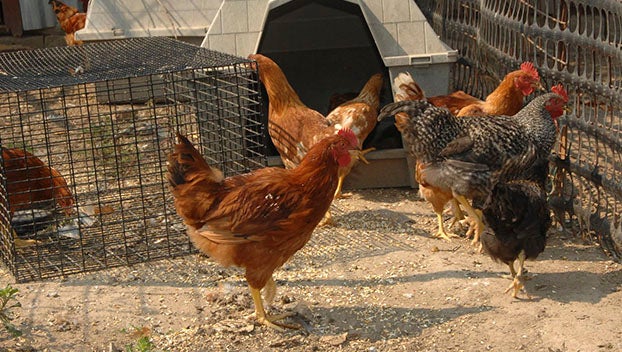Tyson replacement found? Regional Poultry Cooperative launches
Published 12:19 pm Friday, March 1, 2024
|
Getting your Trinity Audio player ready...
|
When Tyson Foods closed its Glen Allen processing plant back in May of last year, it hurt 55 farmers in 13 counties. It also hurt a number of small businesses, all of which worked with the operation. You fix that by finding a Tyson replacement, something to help fill the gap for those affected in Prince Edward, Cumberland and the rest of the region. That alternative, the Central Virginia Poultry Cooperative, is now officially in place.
On Wednesday, Feb. 28, Virginia Secretary of Agriculture Matthew Lohr announced the creation of the Cooperative. Speaking at a Burkeville farm, he praised the work from multiple groups that brought this project across the finish line.
“I commend the team of public and private entities that rolled up their sleeves, went to work and played a role in the formation of the Central Virginia Poultry Cooperative and getting the poultry producers in this region farming again,” Lohr said. “Virginia poultry farmers produced nearly 62 million eggs in 2022 and I look forward to seeing that number eclipsed in the future, thanks to the family farms in Central Virginia and Dutch Country Organics.”
He’s referring to the months of work by a number of county officials, members of Virginia Farm Bureau, Agriculture staff, officials from the Commonwealth Regional Council and farmers. Staff from Cumberland, Prince Edward, Charlotte, Lunenburg and Nottoway counties, among others, worked to help put this together. The counties also contributed financially, as we’ll mention in a minute.
Is this a possible Tyson replacement?
So what do we know about the Poultry Cooperative? It will cover the entire region, including Amelia, Buckingham, Charlotte, Cumberland, Lunenburg, Nottoway and Prince Edward counties. We also know from Wednesday’s announcement that the group plans to produce and sell cage-free and organic table eggs. The goal here is to serve as a supply line to producers who need more eggs. The big contract currently is with Dutch Country Organics LLC out of Indiana. This will give the Cooperative fairly wide distribution, as Dutch Country eggs are sold to national outlets like Walmart, Kroger, Aldi, Target, Costo and Albertsons.
Cooperative President John Bapties said at the Wednesday event his group was happy to help Central Virginia growers get back to farming.
“Central Virginia Poultry Cooperative, Inc. was formed with the hope of returning the poultry growers of Central Virginia back to farming. We have been able to achieve this with help from many individuals and organizations,” Bapties said. “The Co-op and its members would like to express our gratitude to all the state and local agencies who have helped us during the last year. We would also like to thank Dutch Country Organics for giving us this new farming opportunity.”
Bapties said he expects to see growers place the first laying hens in April. Once profits start coming in, he added, that money will be reinvested in the products and processes/equipment. He also said money will go toward member dividends.
Breaking down Tyson replacement numbers
The biggest question, of course, is how it’s being funded. Part of that comes from the Virginia Agriculture and Forestry Industries Development Fund, through a $35,000 planning grant. The grant required a match, so the seven counties in the region split that up, with each one paying $5,000 towards the bill.
Gov. Glenn Youngkin also approved a $50,000 general grant from the Development Fund, with counties once again matching that. The operation will also get a $1.4 million grant from the Tobacco Region Revitalization Commission, to help convert broiler production houses into a home for the cage-free egg operation and $341,750 from the Rural Rehabilitation Trust Fund.
And in case you’re wondering how this Cooperative works, each Coop member will own a share of common stock in the group. Those who own stock will make decisions about running the operation, including choosing the board of directors. In order to sell eggs through the Cooperative, producers must purchase shares of non-voting Class A preferred stock. That stock will be discounted 20% for growers between now and March 31.
A good first step for Poultry Cooperative
Local officials said it was a great step towards rebuilding what was lost, toward finding a Tyson replacement.
“We have growers that lost their ability to produce for Tyson,” said Prince Edward County Board of Supervisors member Cannon Watson. “Even beyond that, a lot of those growers in surrounding counties do business in ours. Now is it a perfect replacement? No, but nothing is. It is, however, a good step forward.”
Prince Edward Administrator Doug Stanley echoed Watson’s statement, pointing out it goes beyond the egg growers.
“The potential impact (of Tyson closing) was not only going to be felt by the growers, but also the grain farmers that sold their corn for feed and the myriad vendors that supported the poultry houses in the region,” Stanley said. “While Prince Edward does not have the number of affected growers as some of our neighbors like Amelia, Nottoway, and Cumberland, as the regional hub it would have had a significant impact on our economy.”
Wednesday’s announcement, Stanley said, gives farmers an opportunity to keep running their family farms.
“I am impressed with the way our region has come together to find a solution and the financial support to make it happen,” he added. “The County of Prince Edward extends its sincere appreciation to the farmers who have put forth so much effort to establish the Co-op and the Governor, the Tobacco Commission, and our neighbors for their support of this effort.”




